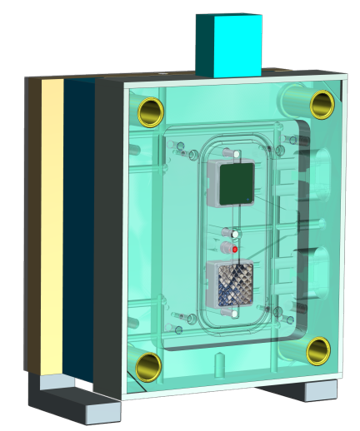Project 'SnakeSkin' Research project (completed)

The aim of the project, which is being jointly applied for by the Esslingen University of Applied Sciences and the Fraunhofer Institute for Mechanics of Materials IWM, is to develop industrial manufacturing processes for the production of bio-inspired nanostructures with high durability on polymer surfaces with a direction-dependent coefficient of friction (coefficient of friction on demand) that can be freely adjusted over a wide range and in line with requirements. Possible applications include the fields of medical and microsystems technology as well as storage and conveyor technology. Both small and large surfaces can be structured and thus functionalized in the desired injection molding process. In order to achieve this goal, processes for PVD-based, large-area deposition of directed (anisotropic) nanostructures are to be developed in the project. Such structures are to be applied to tools for plastic injection molding and molded into crosslinking polymers in the injection molding process so that structures modelled on the California King Snake can be created on the polymer surface. The skin of the King Snake has a special anisotropic micro- and nanostructure that allows the snake to move safely even on the most difficult surfaces. The tool surface can be flat or slightly curved and the surface can already have a microstructure introduced by conventional processing methods. The application of anisotropic nanostructures is to be achieved by an adapted process control in the coating process and by exploiting self-organization effects in the layer growth. In the injection molding process, it is to be investigated how the structures on the tool surfaces can be transferred to the component surfaces by means of targeted process control and how they can be reliably demolded. For increased durability, the nanostructures are to be molded in Liquid Silicone Rubber (LSR), a silicone suitable for injection molding. Variothermal temperature control is used for optimized replication. In contrast to the processing of thermoplastics, the mold surface is actively cooled before injection.
In the course of the project, such nanostructured demonstrator components will be sampled and characterized with respect to their friction coefficient properties and resistance. This is intended to provide evidence of the anisotropic, tribological effect of nanostructures and thus the targeted, direction-dependent friction coefficient modification. In the future, improved instruments for minimally invasive surgery, for example, will be available that will provide the surgeon with significantly improved haptic feedback compared to existing solutions. A further application is seen in conveyor technology, where direction-dependent and low-wear surfaces can be used, e.g. in vibrating spiral conveyors.
Duration: October 2018 - December 2021
Project partner: Fraunhofer Institute for Mechanics of Materials
Project sponsor: VDI Technology Center, Project sponsor of the Baden-Württemberg Foundation
Contact persons: Prof. Dr.-Ing. Matthias Deckert, Dennis Weißer, M.Sc.
Publication:
Interested? Find out more! about our degree programmes
Explore now and
find a course